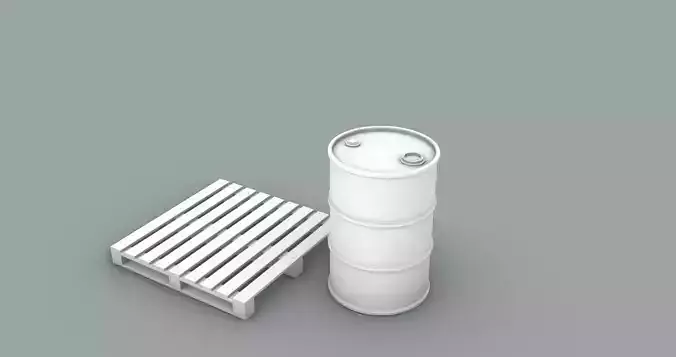1/13
3D Model Set of Oil Barrel and Wooden Pallet, made for 3D Model of Ship Car Carrier.
Model is ready to be used in 3D Printing, Design, CNC..
Notes:
All models are preprinted in order to get highest quality possible.
Model is simplified for printing.
Dimensions
Wooden Pallet
Length: 11mm
Width: 11mm
Height: 1.3mm
Oil Barrel
Length: 6.39mm
Width: 6.39mm
Height: 9.52mm
Includes OBJ and STL file.
About
A pallet (also called a skid) is a flat transport structure, which supports goods in a stable fashion while being lifted by a forklift, a pallet jack, a front loader, a jacking device, or an erect crane. A pallet is the structural foundation of a unit load, which allows handling and storage efficiencies. Goods in shipping containers are often placed on a pallet secured with strapping, stretch wrap or shrink wrap and shipped. Since its invention in the twentieth century, its use has dramatically supplanted older forms of crating like the wooden box and the wooden barrel, as it works well with modern packaging like corrugated boxes and intermodal containers commonly used for bulk shipping. In addition, pallet collars can be used to support and protect items shipped and stored on pallets. While most pallets are wooden, pallets can also be made of plastic, metal, paper, and recycled materials.A barrel is one of several units of volume applied in various contexts; there are dry barrels, fluid barrels (such as the U.K. beer barrel and U.S. beer barrel), oil barrels, and so forth. For historical reasons the volumes of some barrel units are roughly double the volumes of others; volumes in common use range approximately from 100 to 200 litres (22 to 44 imp gal; 26 to 53 US gal). In many connections the term drum is used almost interchangeably with barrel. Since medieval times the term barrel as a unit of measure has had various meanings throughout Europe, ranging from about 100 litres to about 1,000 litres. The name was derived in medieval times from the French baril, of unknown origin, but still in use, both in French and as derivations in many other languages such as Italian, Polish, and Spanish. In most countries such usage is obsolescent, increasingly superseded by SI units. As a result, the meaning of corresponding words and related concepts (vat, cask, keg etc.) in other languages often refers to a physical container rather than a known measure. In the international oil market context, however, prices in United States dollars per barrel are commonly used, and the term is variously translated, often to derivations of the Latin / Teutonic root fat (for example vat or Fass).[1] In other commercial connections, barrel sizes such as beer keg volumes also are standardised in many countries.
REVIEWS & COMMENTS
accuracy, and usability.













